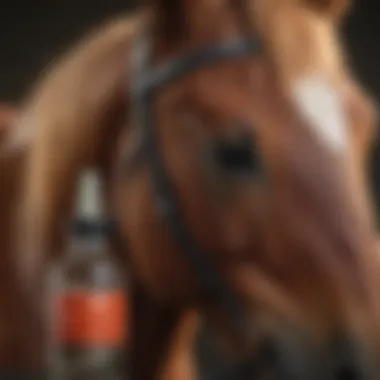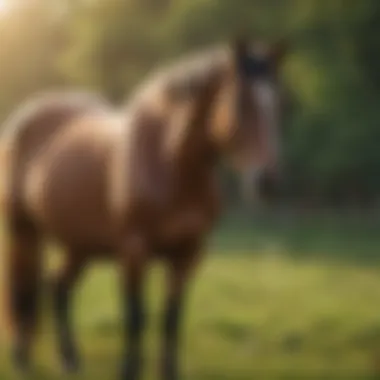Essential Vaccinations for Horses: A Comprehensive Guide


Intro
Vaccinations play a crucial role in maintaining the health and longevity of horses. An understanding of the types of vaccinations available and their importance helps horse owners ensure the well-being of their equine companions. This guide will explore the various aspects of vaccinations, including their types, schedules, and the significance of veterinary involvement in vaccination programs.
Vaccination protects horses from various diseases that can affect their overall health and performance. By immunizing against these diseases, owners can prevent outbreaks and protect not only their horses but also the wider equine community. Education on this topic is vital for those in charge of horse care.
Proper vaccinations depend on factors like the horse's age, lifestyle, and geographic location. Understanding these criteria can help owners tailor a vaccination plan that best suits their horse's needs. Misconceptions often cloud a horse owner's perspective on vaccinations, making it essential to separate facts from myths.
As we delve into this comprehensive guide, we will outline the critical points that will be discussed, emphasizing the importance of proactive health measures in equine care. The integration of vaccinations in regular health maintenance routines will be a cornerstone of this discussion.
Prelims to Equine Vaccination
Vaccination plays a crucial role in maintaining the health of horses. It is not only a preventive measure but also a critical strategy for managing disease outbreak in equine populations. The knowledge of vaccinations can empower horse owners and caretakers to make informed decisions about the health and well-being of their animals. In this guide, we will delve into the essential aspects of equine vaccination.
Understanding the Importance of Vaccination
Vaccination is essential for several reasons. First, it helps prevent the spread of various infectious diseases that can affect horses, some of which can be lethal. Diseases such as rabies and tetanus pose significant health risks and are largely preventable through vaccination. Immunization also protects horses from diseases that could potentially harm other equines, thus contributing to herd health.
In many regions, there are specific legal requirements for certain vaccinations, making compliance crucial not just for the health of individual animals but also for public health and safety. Furthermore, regularly updated vaccination protocols can enhance the performance of the horses in athletic and competitive environments. Horses exposed to various risks will benefit most from thorough vaccination schedules.
Overview of Vaccine Types
There are two primary categories of vaccines used in equine health: core vaccines and risk-based vaccines.
- Core Vaccines are recommended for all horses, regardless of their lifestyle and geographical location. These include vaccinations against diseases like tetanus and rabies.
- Risk-Based Vaccines are tailored based on the individual horse's environment, use, age, and health status. For example, horses that travel frequently may require vaccines for diseases prevalent in different regions.
By understanding the types of vaccines, horse owners can better select the appropriate vaccination strategy for their equine companions. This section will elaborate further on these categories in upcoming sections, providing comprehensive insights into each specific vaccine.
Core Vaccines for Horses
Core vaccines are vital in ensuring the health and longevity of horses. These vaccines protect against diseases that pose serious threats to equine health and can affect overall horse populations. Vaccination can lead to immunity development, reducing the risk of illness and protecting animals from severe health complications. Prioritizing core vaccines helps horse owners safeguard not only the health of their animals but also the larger community. By ensuring proper immunization, a horse can maintain better performance and quality of life.
West Nile Virus Vaccine
The West Nile virus vaccine is critical due to the potentially fatal nature of the virus. This disease is transmitted through mosquitoes and can cause neurological disorders in horses. Symptoms may include fever, weakness, and changes in behavior. The vaccine works by stimulating an immune response, allowing the horse’s body to combat the virus effectively if exposed. The vaccination is recommended annually, particularly before mosquito season in warmer climates. Keeping horses vaccinated is essential for both individual health and public safety.
Eastern/Western Equine Encephalomyelitis Vaccine
Both Eastern and Western equine encephalomyelitis are serious viral infections that can lead to severe neurological issues. These vaccines provide crucial defense against exposure to these viruses, prevalent in many regions during certain parts of the year. The vaccines prepare the immune system to recognize and fight off these viruses promptly. Vaccination is advised at least once a year but can depend on geographical region and seasonal patterns of disease. Consult a veterinarian for the most suitable vaccination timeline.
Tetanus Vaccine


Tetanus is caused by a toxin produced by the bacterium Clostridium tetani, which is ubiquitous in the environment. Horses are particularly prone to tetanus due to their lifestyle. A small wound can lead to a life-threatening situation. The tetanus vaccine is highly effective and should be administered every year or every few years, depending on the horse's risk factors. Boosters are particularly important for horses that suffer injuries or undergo procedures that may cause wounds.
Rabies Vaccine
Rabies is almost always fatal once symptoms appear, making vaccination extremely critical. The rabies vaccine protects horses from this viral disease transmitted through bites from infected animals. Vaccination is typically done on an annual basis. Horses that travel or are in areas where rabies is more common should be vaccinated diligently. Ensuring vaccination is not only beneficial for individual horses but also helps control the spread of rabies in the larger animal population.
Influenza Vaccine
Equine influenza is a highly contagious respiratory disease affecting horses, especially those in close contact, like racehorses or show horses. The influenza vaccine protects against this virus, mitigating the risk of outbreaks and boosting the horse's immune response. The vaccine is particularly important for younger horses or those under significant stress, such as competition horses. Revaccination should occur every six to twelve months, depending on exposure risks.
Strangles Vaccine
Strangles, caused by the Streptococcus equi bacteria, is another significant infectious disease affecting horses. It spreads rapidly, particularly in young or stressed animals. The strangles vaccine can significantly reduce the incidence and impact of the disease. Recommended vaccination schedules typically involve an initial dose followed by boosters, depending on risk factors and local outbreaks. Education on symptom recognition is crucial to managing and controlling strangles in horse populations.
Vaccination is not just about preventing individual disease; it contributes to herd immunity, protecting all horses in a community.
Risk-Based Vaccines for Horses
Risk-based vaccines are crucial in maintaining horse health, especially for those exposed to specific environmental risks. Unlike core vaccines that every horse requires, risk-based vaccines target diseases that may not be prevalent everywhere but can pose serious threats to certain populations of horses. Understanding these vaccines helps in making informed decisions that account for the horse's lifestyle, geographical location, and exposure to varied risk factors.
Veterinarians often recommend these vaccines based on the horse's individual circumstances. Evaluating factors such as the horse's activity level and the area's disease prevalence matters significantly. This can mean the difference between a healthy, thriving horse and one that might face severe health issues.
Vaccination Schedules
The scheduling of vaccinations for horses plays a vital role in their overall health and well-being. Understanding the vaccination schedules is crucial for ensuring effective immunization against various diseases. A structured schedule helps in initiating the vaccine series at the appropriate times and also in maintaining the immunity levels through timely booster shots.
Timely administration of vaccines is essential because it aligns with the horse's age, developmental stage, and exposure to potential diseases. For instance, young foals need their initial vaccination series completed before they face the world outside. Adult horses, on the other hand, require booster shots to sustain their immunity.
Vaccination schedules also assist in coordinating veterinary visits. This organization minimizes stress for both the horse and the owner. It allows for a comprehensive examination during the vaccination visit, ensuring that any health concerns are addressed.
"A well-planned vaccination schedule is essential for the longevity and vitality of your horse."
Initial Vaccine Series for Foals
Foals receive their initial vaccines at a young age to build their immunity. The first vaccinations are typically given around 4 to 6 months after birth. This timeframe is critical, as foals rely on antibodies from their mother’s colostrum to fend off diseases immediately after birth. As that protection wanes, the foal must begin its vaccination protocol to prepare its immune system for future challenges.
The initial vaccine series usually includes core vaccines such as the West Nile Virus, Eastern/Western Equine Encephalomyelitis, and Tetanus vaccines. These vaccinations help in developing a strong immune response that will protect the foal from those diseases as it grows.
Booster Shots for Adult Horses
Adult horses require booster shots at regular intervals to maintain immunity against specific diseases. The frequency of these shots can vary based on the type of vaccine. For example, some vaccines may require annual boosters, while others might be administered every couple of years.


Booster vaccinations are particularly significant for horses that are regularly exposed to high-risk environments, such as shows or races. Maintaining an adjusted schedule according to lifestyle is crucial. Furthermore, some vaccines, like the influenza vaccine, may need more frequent updates depending on the latest recommendations by veterinarians or equine health organizations.
Considerations for Vaccination Timing
Several factors influence when vaccines should be administered. Age is one critical consideration. Foals require a different schedule compared to adult horses. Lifestyle and activity level also play a vital role. Horses that are more active or involved in competitions may need a more intensive vaccination schedule.
Geographical location affects vaccination timing as well. Some regions may have higher risks of specific diseases, necessitating changes in vaccine strategies. It is also essential to consider health status. A horse's overall health must be evaluated before vaccinating. An ill horse may require adjustment of its vaccination schedule until it is healthy again.
In summary, understanding vaccination schedules is essential for all horse owners. These schedules ensure that horses are adequately protected from preventable diseases, contributing to better health and longevity.
Factors Influencing Vaccination Needs
Understanding the factors that influence vaccination needs is crucial in developing an effective immunization strategy for horses. Individual circumstances can significantly determine the types and timing of vaccinations a horse may require. Recognizing these elements not only fosters better health for the horses but also allows for the optimization of resources used in their care.
Age and Developmental Stage
Age is a critical factor in determining a horse’s vaccination schedule. Foals have unique immunological needs that differ from adult horses. Newborn foals acquire antibodies from their mother’s colostrum, which protects them during the early weeks of life. However, as they grow, this passive immunity fades, making them susceptible to disease.
Foals should begin their vaccination series at around six months of age. Initial vaccinations typically include core vaccines such as the West Nile Virus and Tetanus vaccines. As they progress to yearlings, they may receive additional vaccines tailored to their environment and lifestyle.
Veterinarians recommend regular assessments of the horse’s age, health status, and developmental stage to ensure that vaccinations are both timely and relevant.
Lifestyle and Activity Level
The lifestyle and activity level of a horse also contribute significantly to vaccination needs. Horses that are involved in competitive activities or are regularly exposed to other horses may require different vaccines compared to horses kept in a more isolated or leisurely setting. Performance horses, for instance, might need vaccinations to enhance their immunity against specific diseases they are more likely to encounter in crowded environments.
Horses that spend time outdoors, such as those in pasture-based systems, may also encounter more vectors like mosquitoes and ticks, increasing their risk of vector-borne diseases like West Nile virus or Potomac Horse Fever. Therefore, it’s essential for horse owners to evaluate their horse's daily activities and adjust their vaccination plans accordingly.
Geographical Considerations
The geographical location can dramatically influence vaccination requirements for horses as well. Different regions are home to various pathogens that can cause disease. For example, horses in hot and humid climates may be at a higher risk for diseases such as Eastern and Western Equine Encephalomyelitis which are transmitted by insects.
Additionally, the presence of diseases endemic to certain areas should inform vaccination decisions. Owners must communicate with their veterinarians to assess local disease prevalence, environmental concerns, and other agricultural practices that might affect their horses.
"Local disease prevalence and environmental factors should always be considered when planning an equine vaccination schedule."
In summary, factors such as age, lifestyle, and geographical considerations play a significant role in determining the vaccination needs of horses. By taking these elements into account, horse owners can better protect their animals and contribute to a overall improved health and longevity.
The Role of Veterinarians
Veterinarians play a crucial part in maintaining the health and well-being of horses through effective vaccination strategies. Their expertise is essential not only for administering vaccines but also for guiding horse owners in making informed decisions regarding their equine friends’ health. A veterinarian’s role encompasses an array of responsibilities, from performing thorough examinations to tailoring vaccination schedules to individual needs.


Consultation and Examination
The initial step in an effective vaccination program involves consultation between the horse owner and the veterinarian. During this consultation, the veterinarian conducts a comprehensive examination of the horse, assessing its overall health, age, and any specific risk factors that may influence vaccination choices. This assessment can uncover underlying health issues that might affect the horse's ability to respond to vaccines or necessitate different vaccination strategies.
Regular check-ups are vital. Meetings with a veterinarian allow for monitoring the health status of horses routinely. A veterinarian’s insight can lead to adjustments in vaccination plans based on the evolving health profile of the horse.
Personalized Vaccination Plans
Following the consultation, veterinarians develop personalized vaccination plans tailored to the needs of each horse. This custom approach is critical. Factors such as age, lifestyle, exposure risks, and geographic location all contribute to determining which vaccines are appropriate.
A tailored vaccination schedule ensures that horses receive vaccines when most needed, maximizing their immune response while minimizing potential side effects. Both core and risk-based vaccines can be included in these plans, enhancing overall protection against various diseases.
This individualized strategy often leads to healthier horses with lower incidences of disease, demonstrating the profound impact that veterinarians have on equine welfare.
By prioritizing both the physical examination and the crafting of personalized vaccination plans, veterinarians not only ensure compliance with vaccination protocols but also foster a proactive approach to disease prevention in horses. This commitment to tailored medical care underscores the integral role veterinarians play in equine health management.
Common Misconceptions About Vaccines
Misunderstandings about vaccines can seriously impact equine health. Many horse owners may hold beliefs that are not supported by scientific evidence. This section will examine some of these misconceptions, focusing on the safety and efficacy of vaccines. Addressing these concerns is crucial to promote healthier horses and informed owners.
Safety of Vaccines
The safety of vaccines is a primary concern for many horse owners. It is essential to recognize that vaccines undergo rigorous testing before they are approved for use in horses. Regulatory bodies ensure that vaccines meet stringent safety standards. Serious side effects from vaccines are very rare.
Common reactions may include mild swelling at the injection site or a slight fever. These effects are generally short-lived and should not cause alarm. Studies show that the benefits of vaccination far outweigh the potential risks. Vaccination helps protect horses from serious diseases that can lead to grave health problems or even death.
"Vaccination is a preventive measure that can save equine lives and enhance their quality of life."
Efficacy of Vaccines
Efficacy refers to how well a vaccine protects against specific diseases. Many owners question whether vaccines truly provide the promised protection. Evidence indicates that vaccines significantly reduce the incidence of illnesses such as West Nile virus and rabies. Thorough research supports their effectiveness in stopping the spread of these diseases.
Vaccines work by stimulating the horse's immune system to recognize and fight off pathogens. This prepares the horse to combat infections more effectively in the future. However, it is crucial for horse owners to adhere to vaccination schedules as recommended by veterinarians for optimal protection. Factors such as age, health status, and exposure risk can influence how a horse responds to vaccination.
Closure
The conclusion of this guide holds substantial weight regarding the role vaccinations play in maintaining horse health. A well-structured vaccination program is critical for preventing diseases that can significantly affect the equine population. Understanding which vaccines are crucial and how often they are needed allows horse owners to proactively protect their livestock.
Summary of Key Points
In reviewing the essential vaccinations for horses, several key points emerge:
- Core vaccines such as West Nile Virus, Eastern/Western Equine Encephalomyelitis, Tetanus, Rabies, Influenza, and Strangles are fundamental. These vaccines form the foundation of equine health and are recommended for all horses, regardless of their lifestyle.
- Risk-based vaccines, including Potomac Horse Fever and Equine Viral Arteritis, are tailored to the specific risks faced by horses in different regions and situations. This personalization enhances the effectiveness of the vaccination program.
- Adhering to a vaccination schedule increases the chance of disease prevention. Foals require an initial series of vaccinations, while adult horses need booster shots to maintain immunity levels.
- Factors such as age, lifestyle, and geographical location significantly influence vaccination needs. It's important to assess these variables for effective health management.
- The input of veterinarians is invaluable. Their expertise in shaping personalized vaccination plans helps address specific health concerns while dispelling common misconceptions surrounding vaccine safety and efficacy.
Final Thoughts on Equine Health
"An ounce of prevention is worth a pound of cure." This saying rings particularly true in equine health; preventive measures, like vaccinations, can save horses from significant suffering and potential loss. Understanding and implementing a comprehensive vaccination strategy is not only beneficial but essential for anyone involved in horse care.







